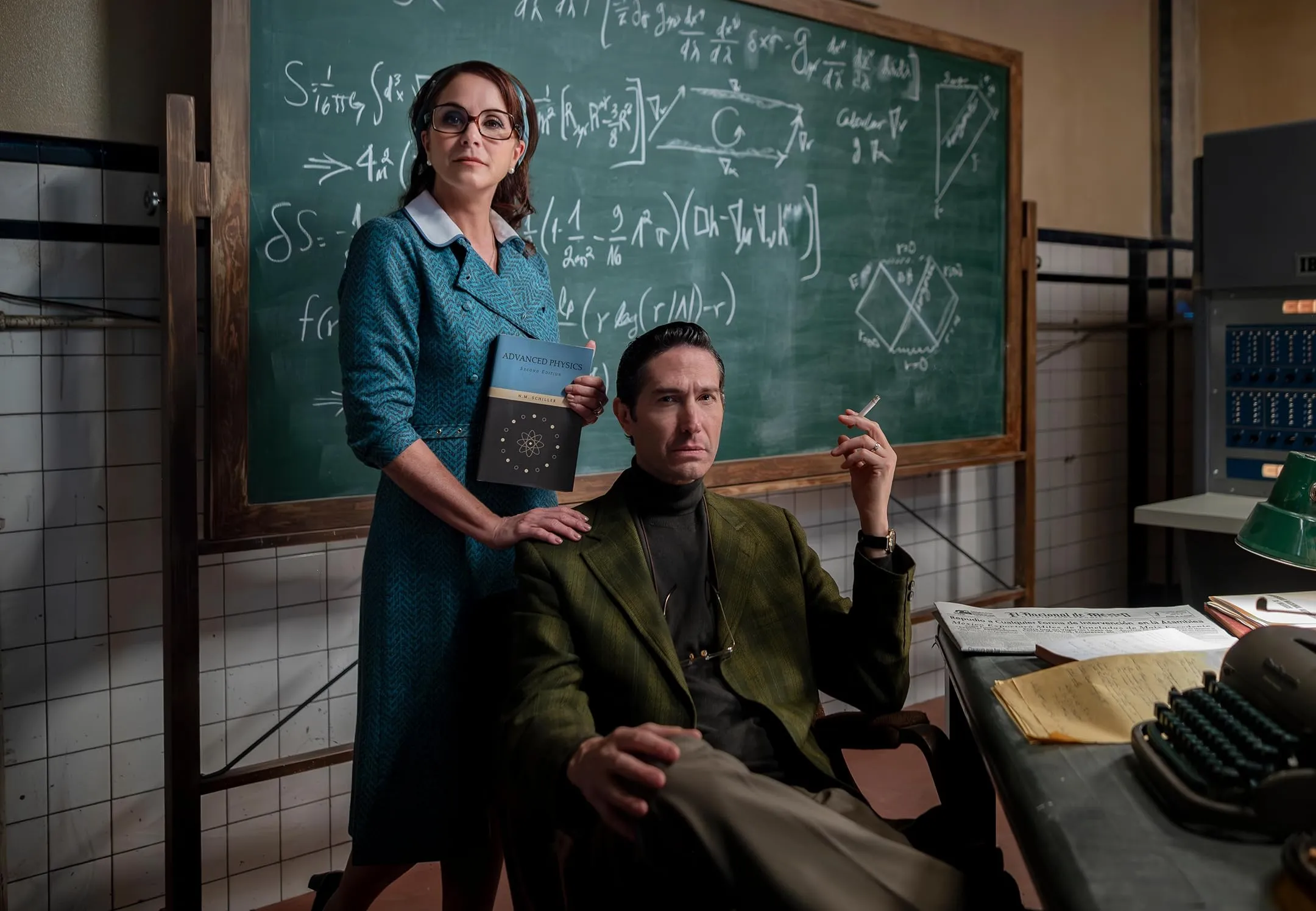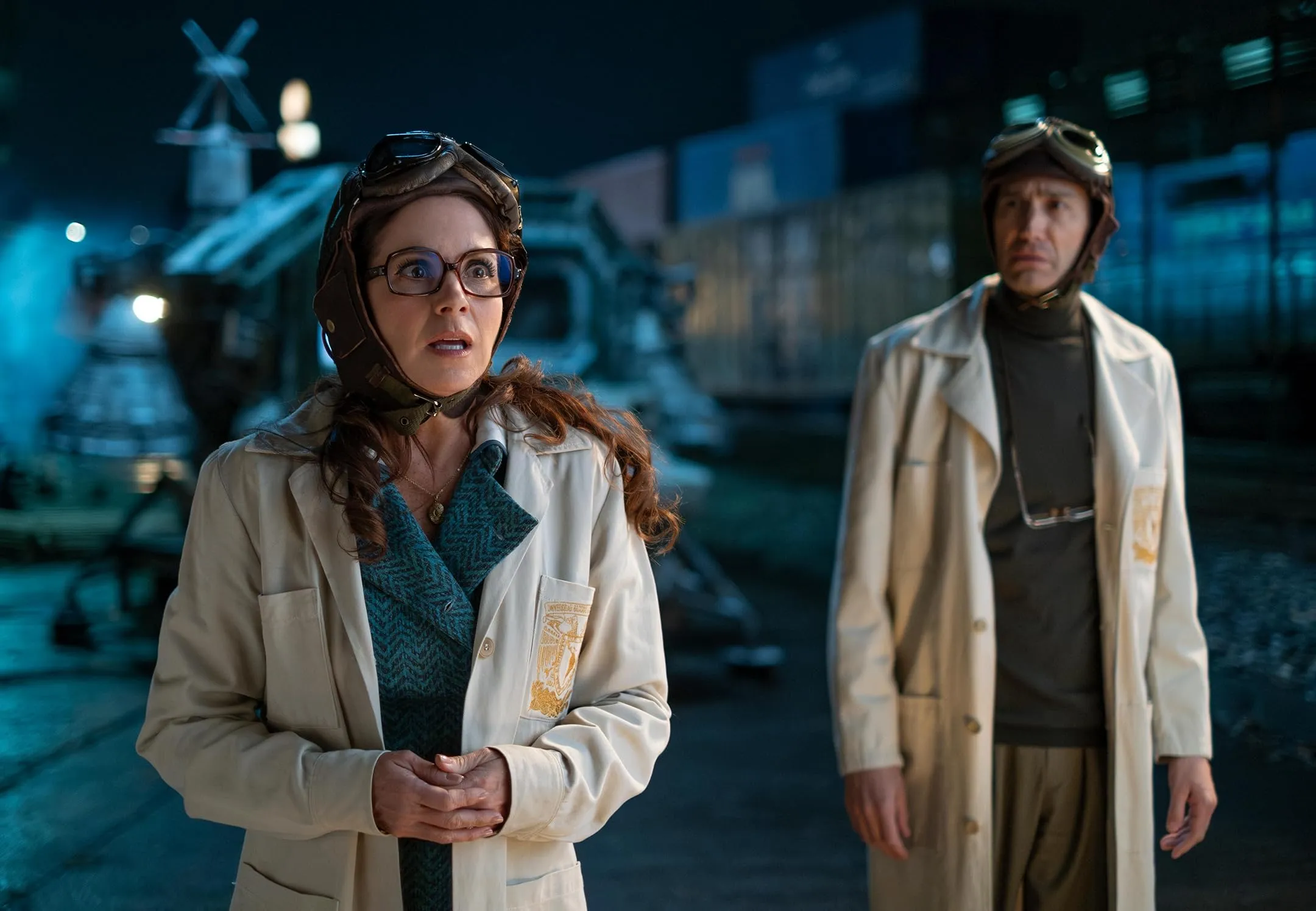In the cinematic landscape, time travel is often a mechanism for grand spectacle or world-saving heroics. Chava Cartas’s Our Times (Nuestros Tiempos), however, uses the device for a more intimate purpose, recalling the social comedies of Indian cinema where a simple shift in environment exposes deep-seated truths. The film opens in 1966 Mexico City, introducing Dr. Nora Cervantes and Dr. Héctor Esquivel, a married pair of physicists bound by affection and a shared scientific ambition.
They are secretly building a time machine. The film quickly establishes its central tension: Nora is a brilliant scientist in an era that patronizes her, forcing her to channel her ideas through her husband. Héctor, who acts as the project’s public face, loves his wife but is a passive participant in the patriarchal system that diminishes her.
Their plan for a minor fifteen-minute hop into the future goes awry, stranding them sixty years ahead in 2025. This accidental leap is not just through years, but through ideologies, setting the stage for a poignant examination of love, identity, and progress.
The Gendered Rift in Time
The film’s true exploration begins once the couple confronts modern Mexico City. The science-fiction premise gracefully gives way to a sharp social drama. For Nora, 2025 is a revelation. Her formidable intellect is not merely tolerated; it is sought after and celebrated. She discovers a professional and personal autonomy she never knew, addressing conferences and leading research in a world that sees her for her mind.
This newfound liberation makes the thought of returning to 1966 a complex proposition. The experience mirrors the awakening seen in many female protagonists in world cinema, who find their voice when removed from stifling domesticity. Héctor’s experience is the stark opposite. His identity, built on the unquestioned privileges of his time, crumbles.
He is unnerved by a world where he is no longer the default authority, and Nora’s ascent fuels a profound jealousy. This dynamic is reminiscent of the classic 1973 Hindi film Abhimaan, where a husband cannot reconcile with his wife’s greater success. Our Times uses its temporal displacement to ask a potent question: can a relationship, founded on the unspoken rules of one era, survive in another?
Stardom, Symbolism, and a Modest Frame
The film is anchored by the performances of its leads, Lucero and Benny Ibarra, whose real-life star power in Mexico lends gravity to their roles. Their chemistry in the opening scenes effectively sells their deep bond, making its later fracture more impactful.
Lucero portrays Nora’s transformation with a subtle strength, embodying her character’s quiet confidence as it blossoms into open self-assurance. Ibarra navigates the difficult arc of Héctor, shifting from a supportive spouse to a man soured by his own irrelevance, a change that can at times feel jarringly swift. The film’s aesthetic feels grounded and functional.
The time machine itself is a delightful creation of wires, dials, and leather caps, a perfect relic of its 1960s origin. The visual presentation of the film carries the air of a television production, prioritizing character and story over cinematic grandeur. This modest approach recalls India’s parallel cinema movement, where directors often worked with limited budgets to tell realistic stories that challenged social norms, proving that a film’s impact does not depend on its scale.
A Story Against the Clock
Our Times unfolds over a brisk 90 minutes, a runtime that serves its setup well but feels insufficient for the complex ideas it introduces. The initial establishment of the characters and their predicament is handled with efficiency.
The second half, however, feels constrained by the need to resolve its profound questions too quickly. The exploration of Héctor’s emotional state, for example, feels somewhat shallow, leaving his character feeling more like a narrative obstacle than a fully realized person. The plot progresses along a clear, if somewhat conventional, path toward its resolution.
The ending itself provides a neat answer to the couple’s dilemma but may strike some viewers as emotionally thin. After building a significant conflict rooted in decades of social change, the film’s soft landing feels like a missed opportunity for a more resonant statement. The movie presents a fascinating premise, using a familiar genre to probe at very real human and societal issues, even if its execution is hurried by its own clock.
Our Times premiered via Netflix on June 11, 2025, and runs about 90 minutes.
Full Credits
Director: Chava Cartas
Writers: Juan Carlos Garzón, Angélica Gudiño
Cast: Lucero, Benny Ibarra, Renata Vaca, Ofelia Medina, Hugo Albores, Roberto Blancarte, Guadalupe Damián, Andrés De León, Franklin Gamonal, Lore Graniewicz, Samantha Iserte, Berenice Jonguitud, Abraham Jurado, Andrés Llera, Claudia Lobo
The Review
Our Times
Our Times uses a clever sci-fi premise to explore universal questions of love and societal change. Strong performances from its leads anchor the story's emotional core. The film’s brief runtime, however, rushes its complex ideas, leading to an underdeveloped central conflict and a tidy ending that feels emotionally slight. It is a thoughtful picture whose ambition is ultimately constrained by its narrative economy, presenting a fascinating "what if" that it never fully explores.
PROS
- Intelligent use of science fiction for social commentary.
- Charming lead performances with genuine chemistry.
- Relevant exploration of gender dynamics and societal progress.
CONS
- Rushed narrative pace undermines its thematic depth.
- The ending feels abrupt and emotionally unsatisfying.
- Key character motivations can feel underdeveloped.


















































